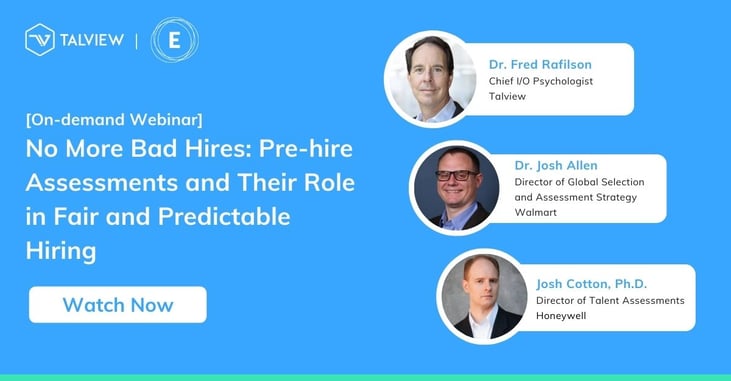Pre-Hire Assessments and Their Role in Fair and Predictable Hiring
Eliminating uncertainty from the hiring process has long been a top priority for organizations. Two of the key tactics for accomplishing this have been the interview and pre-hire assessments. Interviews have long been prone to controversy, particularly when it comes to unconscious bias. Due to the simple lack of insight into the interview process, there are frequently conflicting recommendations and analysis of interviewed candidates. And now, with the increase of AI in hiring and pre-hire assessments, how can talent acquisition professionals ensure that pre-hire assessments are valid and unbiased?
Talview recently sponsored an ERE webinar centered around pre-hire assessments with three experts in the field. The webinar explores how HR and TA leaders can effectively and fairly execute job analysis and assessments, to evaluate and measure the skills, abilities, and traits required for on-the-job success.The on-demand webinar panel consists of:
- Dr. Fred Rafilson, Chief I/O Psychologist, Talview
- Dr. Josh Allen, Walmart, Director of Global Selection and Assessment Strategy
- Josh Cotton, Ph.D., Honeywell, Director of Talent Assessments
Their focus on the webinar examines best practices in administering evaluations for target roles, understanding the role of AI in assessments and hiring, establishing test validity – especially in the areas of content, construct, & criterion-related validity evidence – and ensuring test fairness and mitigating adverse impacts.
Below are excerpts from the webinar, No More Bad Hires: Pre-Hire Assessments and Their Role in Fair and Predictable Hiring.
Excerpts from the On-Demand webinar, No More Bad Hires
“What's the value of assessments? How do they help? What do good assessments do?
The Cost of Talent Acquisition & HR Technologies
There are a bunch of factors to consider when determining whether an assessment is good or not. The first one being cost. I've seen them as low as a couple of dollars and I've seen them as high as a couple of thousand dollars. So first, establish a price point. The cost of a bad hire is well understood. If an assessment process is working, even several thousand is a good buy.
Assessments Reduce Turnover
I was at a conference recently, and they were talking about the impact of turnover on others that are left in the organization. I've heard it said before that quitting is contagious. It's true. When one person leaves, you can calculate the cost of that one person being replaced. But, depending on who this person is, it is now predictive of who else will leave.
For example, if your boss, or somebody you worked very closely with leaves, that's more likely to trigger multiple people quitting. If you can avoid things like that, because you pick the right person in the first place – they come in, they thrive, they're a good fit for the culture, the environment, the work – then you've realized a huge cost-savings.
Job Analysis
On the science side, you want to make sure there's really three things to look for:
- The assessment is relevant
- It's predictive
- It's fair
So how do you determine whether it's relevant? You don't want an assessment that's asking questions about childhood ice cream preferences. That may be predictive, but it's not relevant. You want to find stuff that is both predictive and relevant. We do that through a process we call job analysis.
The purpose of a job analysis is really to understand the job and figure out what are the building blocks of it, what’s necessary, so that you can link it to the assessment. Predictive is really a correlation. People who do better on the assessment, who have higher scores, also tend to do better in the job. And then comes fair.
Reducing Bias in the Hiring Process
If you have a hiring process that is picking one particular group over another, it may not be an accurate hiring process. It may be a bias process. We want to eliminate that because we want to pick the right person for the right job, regardless of groups.
Assessments can help remove bias from the hiring system. But there is a bias against the assessments. There's a general perception out there that assessments are not fair.
Honestly, resume reviews and interviews are not fair, job posting sometimes are not fair. The assessments are.
Assessments deliver the same set of questions. Everybody gets it, the scores, people look at the data to ensure that group differences don't exist. It's hard to do that on interviews, nearly impossible. Same with resume reviews. Yes, there's bias in the hiring process. 100% agree. But assessments, I like this place where we've squeezed most bias out of the hiring process.
If employees fit and they're driven and they're engaged,
they should be increasing the bottom line
Validating an Assessment
My field obsesses about predicting one person in one job. So that's what we screened for. That's what our tools are designed around. But nobody is being placed in an isolated job. They are going to be influenced by the people around them.
We're ignoring a lot of context. It's okay because our prediction method can factor some of that in.
The first time I showed a correlation to an engineer, I don't remember exactly what the number was, but he said, ‘You're telling me this is good. But in my world, .99995 is good. That's not what I'm seeing here.’ And I'm like, ‘Oh, okay, hold on, you can't predict humans that well.’ You’re just trying to get the odds stacked in your favor.“
The Talview On-Demand Webinar
View the entire webinar at your convenience, at Talview. We have a large selection of resources – informative articles, blog posts, webinars, and more – that examine talent acquisition, talent measurement, recruitment technologies, proctoring technologies, and the end-to-end enterprise hiring process to help you keep pace with the rapidly changing, global HR tech landscape.
View the On-Demand Webinar








Leave a Reply